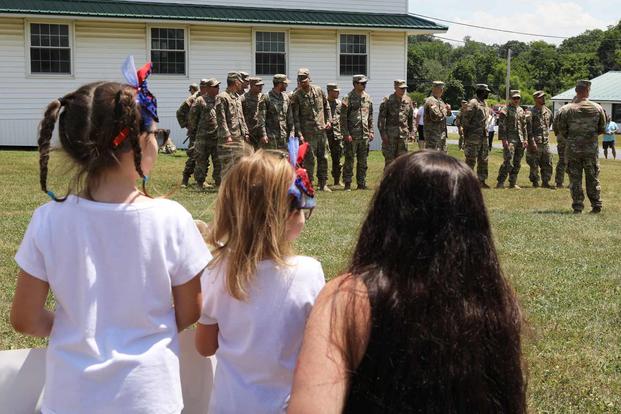The number of military personnel and veterans who would recommend joining the armed forces has dropped in the past two years -- a waning enthusiasm that could threaten national security, according to new research released Thursday.
The 2021 Military Family Support Programming Survey, which involved 8,638 active-duty members, retirees, dependents and veterans, found that, while 63% of those surveyed would recommend military life to someone considering, that number was down from 75% in 2019.
The survey also found that enlisted members and their spouses were significantly less inclined to recommend military service than officers and their families.
Read Next: How 2 American Veterans Ended Up in Ukraine, Prisoners of Russian-Armed Militants
The change is concerning because, increasingly, more members of the armed services are the children of either serving personnel or veterans, advocates say. According to Army Recruiting Command, 79% of recruits in 2019 had a relative who served.
"To me, it was alarming. It was a big drop," said Shannon Razsadin, a Navy spouse and executive director of the Military Family Advisory Network, which sponsored the survey. "We know that the future of the all-volunteer force is military kids. We joke that the military is a family business."
MFAN has conducted the survey each year since 2014 to understand the issues facing military families. The review explores mental and financial well-being, health care, debt, housing and more, with an eye toward making recommendations and creating programs to improve quality of life.
This year's survey found that, like many Americans, military families are struggling financially. More than 40% reported having a total household income of $25,000 to $75,000, the lower amounts being below the poverty line in the U.S. for a family of four, at $26,500, and more than 50% said they spend more than half their monthly income, including their housing allowances, on housing and utilities.
Military families also reported financial strain, with more than 22% of actively serving families and 38.4% of veteran families saying they had less than $500 in savings for emergencies. Nearly 76% reported that they carried debt, with mortgages, credit cards and auto loans causing the most financial stress.
Some families also face difficulties putting food on the table: The number of military and veteran families experiencing food insecurity, defined as having limited, reliable access to nutritious food, was 1 in 6 in 2021 -- an improvement from 2020, when it was 1 in 5 families, but down from 2019, when one in 8 families reported being food insecure.
Razsadin said MFAN is concerned because the survey was taken before the price of food and gas skyrocketed as the result of inflation and federal protections under the COVID-19 pandemic were removed.
"It's no surprise that people are really having a hard time making ends meet," Razsadin said.
As military families struggle with financial stability, they also work to maintain a decent quality of life, with happy productive families that work as a team, according to the report. In 2021, roughly 41% reported having "excellent" family health and 44.7% having moderate family health, with the remainder saying their families were in poor condition.
Broken down by rank, however, enlisted families from paygrades E-1 to E-6 made up the majority of those reporting poor family health.
"This is something we'll be spending time on over the course of next year, dissecting the 'why?' there. Enlisted families are not reaching the same level of well-being as officer families," Razsadin said.
When it comes to health care, retirees and veterans in the survey tended to rate their quality of care better than active-duty families, but retirees reported more difficulty getting appointments and accessing care than active-duty families or veterans.
Access issues weren't limited to retirees, however. One Navy spouse wrote that she sometimes needed to make medical appointments six months in advance.
"Not enough providers ... difficult to see providers, providers not prov[id]ing adequate care," the spouse wrote.
And an Army spouse said they had learned how to game the system to get care.
"It shouldn't be this way," the spouse wrote. "It is exhausting and sad -- it is breaking military families. We really don't want to beg for basic health care needs that we have been promised, but we need to in order to survive."
Other findings of interest in the survey include:
- 48% reported dissatisfaction with access to mental health services
- 78.3% have found it difficult to get child care during the last two years
- 54% reported being lonely, separated from spouses and isolated from family
The group included several recommendations for improving the lives of military families in its report on the survey, proposals it hopes that the Pentagon and Congress will consider when they draft policies or make laws.
The recommendations include increasing the availability of medical appointments and child care spots, adjusting pay to counter rising prices and raising the Basic Allowance for Housing in some instances to relieve financial strain.
"The Basic Needs Allowance [a stipend for service members with incomes less than 130% of the federal poverty line] is sitting in the Pentagon right now. I'm hoping that this is put out in a way that is accessible to families," Razsadin said. And I really, really hope that the Basic Allowance for Housing is resized. ... There's no reason why [military families] should be living in campers."
The full report can be found on MFAN's website.
– Patricia Kime can be reached at Patricia.Kime@Military.com. Follow her on Twitter @patriciakime.
Related: Mold, Lead and Vermin: Survey Finds Toxic Conditions in Military Housing











